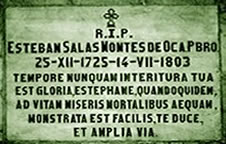Esteban Salas: father of the sacred music in Cuba
- Submitted by: admin
- Editorial Articles
- Culture and Traditions
- Personalities
- 10 / 23 / 2006

Esteban Salas is considered the starting point for the practice of the sacred music in Cuba. The Cuban religious music before was only reduced to literal reproductions of the canticles of books from other regions. The work of Salas originated a discipline unknown in Cuba those days. From that moment on, the chorus of the cathedral was used for concert hall.
He was born on December 25, 1725; he made musical studies in the parish church. Later, he was graduated in Philosophy, Theology and Canon Law at the university. That is why he lived as an ecclesiastical man with certain mysticism taking a vow of poverty and wearing black clothes.
On February 1764, Salas arrived to Santiago de Cuba to work as a Music Professor. First, he took some exams set by the Cathedral canon. The test consisted of composing shortly a Hymn to the Virgin. One year later, the Royal Certificate of Charles the third of Spain made such occupation official. As the result of Salas works in the Cathedral of Santiago, aiming at developing the encouragement of an authentically Cuban sacred music, a small classic orchestra was created.
In 1766 an earthquake of great proportions occurred in the eastern region of the island that seriously affected the place where Salas taught and made concerts. Nevertheless, Esteban Salas worked harder together with musicians and cantors to acquaint them with more difficult techniques. He created continually and with novel inspirations masses, motets, Christmas carols, psalms and hymns in Spanish language.
He died in 1803 after carrying out this work for 39 years. He was considered the baroque-classic style of the Cuban music due to the important links that he established with the European music of his time introducing a style that still remains influenced with certain expressions of the popular music.
Comments